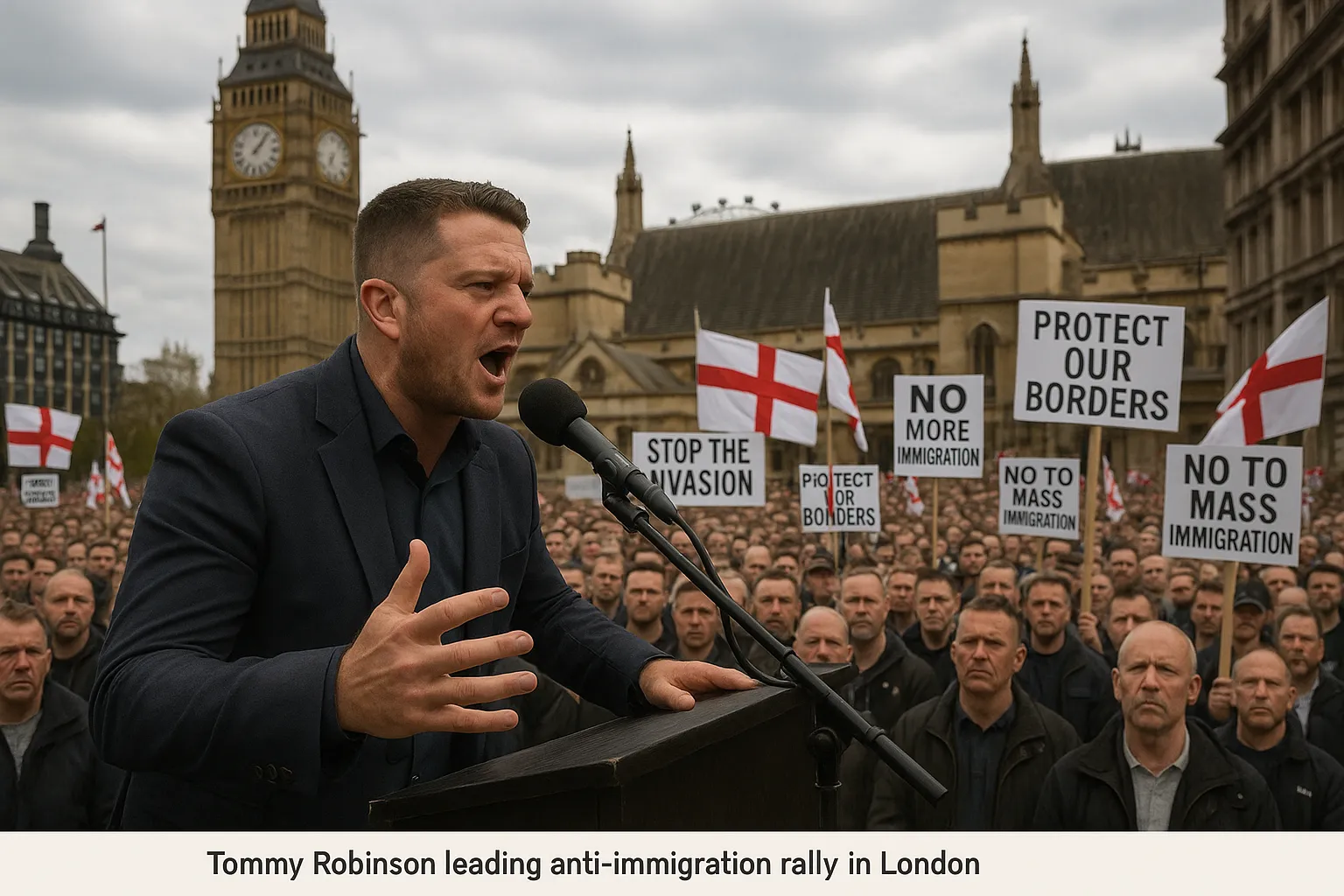Tommy Robinson: Far-Right Figure Behind Massive London Rally

Lead: British far-right activist Tommy Robinson, real name Stephen Yaxley-Lennon, led today’s “Unite the Kingdom” rally in central London drawing an estimated 110,000 protesters in clashes with police on Saturday.
Nut Graf: Robinson has risen from fringe street demonstrations to spearheading one of the UK’s largest anti-immigration marches, tapping into public unease over immigration and free-speech debates. His notoriety stems from founding the English Defence League (EDL), multiple criminal convictions and a revival of his platform under Elon Musk’s Twitter ownership.
Rally Sparks Violence and Debate
London’s Metropolitan Police reported “unacceptable violence” as officers faced thrown bottles and flares, leaving 26 injured-four seriously-and making 25 arrests. Counter-protesters organised by Stand Up to Racism numbered around 5,000, separated by barricades to prevent further clashes.
Profile: Stephen Yaxley-Lennon
- Adopted the name Tommy Robinson when co-founding the English Defence League in 2009 in Luton, a group known for anti-Islam rhetoric.
- Positions himself as a free-speech campaigner, accusing UK courts of prioritising migrant rights over British citizens.
- Cultivated ties with US conservative outlets and right-wing groups, addressing followers via Fox News and Infowars.
Controversies and Convictions
Robinson’s activist career has been marred by legal battles and social-media bans:
- Convicted of assault (2005), passport fraud (2012), mortgage fraud (2014) and contempt of court (2018); served multiple prison sentences.
- Banned from Twitter in 2018 and Facebook/Instagram in 2019 for hate-speech violations; account restored after Elon Musk’s acquisition in 2022, amassing over one million followers.
- Sentenced in October 2024 to 18 months for violating an injunction against repeating libellous claims about Syrian refugees; released early in May 2025.
Influence and Future Prospects
Robinson’s ability to mobilise large crowds highlights a persistent undercurrent of nationalist sentiment in Britain. While mainstream parties distance themselves from his rhetoric, his supporters view him as a champion of British identity and free speech. Authorities warn this may only be the beginning of further actions and investigations into those involved in Saturday’s unrest.
Categories
Autos and vehicles Beauty and fashion Business and finance Climate Entertainment Food and drink Games Health Hobbies and leisure Jobs and education Law and government Other Politics Science Shopping Sports Technology Travel and transportationRecent Posts
Tags
Archives
08/19/2025 (3) 08/20/2025 (40) 08/21/2025 (27) 08/22/2025 (22) 08/23/2025 (4) 08/24/2025 (21) 08/25/2025 (30) 08/26/2025 (24) 08/27/2025 (29) 08/28/2025 (16) 08/29/2025 (9) 08/30/2025 (13) 08/31/2025 (17) 09/01/2025 (167) 09/02/2025 (124) 09/03/2025 (149) 09/04/2025 (112) 09/05/2025 (72) 09/06/2025 (169) 09/07/2025 (162) 09/08/2025 (150) 09/09/2025 (176) 09/10/2025 (194) 09/11/2025 (194) 09/12/2025 (186) 09/13/2025 (207) 09/14/2025 (159) 09/15/2025 (175) 09/16/2025 (198) 09/17/2025 (196) 09/18/2025 (196) 09/19/2025 (207) 09/20/2025 (129) 09/21/2025 (4)